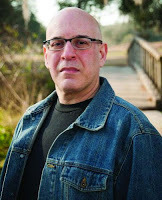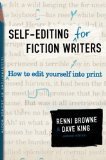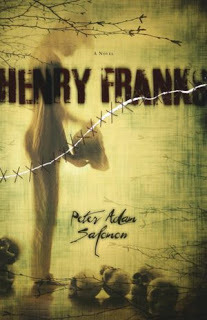After The First Draft: Attitude Is Everything
 Hi Everyone! I am super-pleased to welcome author Peter Salomon to the blog. Peter's new YA book, HENRY FRANKS just released through Flux and I can't wait to snag a copy. The blurb is at the end--read it and you'll see why! However, just to tease you a little, here's a snippet:
Hi Everyone! I am super-pleased to welcome author Peter Salomon to the blog. Peter's new YA book, HENRY FRANKS just released through Flux and I can't wait to snag a copy. The blurb is at the end--read it and you'll see why! However, just to tease you a little, here's a snippet: Four thousand, three hundred and seventeen stitches, his father had told him once.
All the King's horses and all the King's men had put Henry Franks back together again.
Now here's Peter & his thoughts on After The First Draft.
~ ~ * ~ ~
Congratulations, you've finished the first draft of your novel! I'm serious, this is something that calls for a minor celebration. There are untold numbers of people who have thought "I should write a book" and never started, or started and never finished. You've finished! This is great.
Now the hard part starts.
Yes, I'm sorry to have to be the bearer of bad news but, all things considered, writing that first draft will probably turn out to have been easier, simpler and FAR quicker than revising/editing the thing.
But, and this is important: just as there were times while you were writing that first draft where you might have wanted to give up, thinking 'this'll never be over' or 'this is taking forever' there will be those same moments as you edit...and, guess what? Just as you did finish that first draft, you will finish the second draft as well.
Of course, there will most likely be a lot more rounds of revision before your novel is ready to query agents about. And, even then, after signing with an agent? More edits. After the novel sells? Yes, that's right: more edits.
So, there are two ways to look at that finished document, after typing "The End" for the first time on that first draft: 1) It's perfect as is, I hate editing, let's query now and 2) EVERYTHING else...because #1 is a TERRIBLE idea.


There are a number of wonderful books out there to help you edit (my personal favorite is 'Self-Editing For Fiction Writers' by Renni Brown and Dave King so the actual nuts-and-bolts of editing and revising can be found elsewhere.
Instead I'd like to talk about 'Attitude.' Yes, attitude.
I know editing is hard, revising seems insurmountable, the book's done, it's hard to work up the same passion once 'The End' has been typed, that passion that drove you to the page, kept you thinking of the characters even when you weren't writing, had you having conversations between your characters in your head as you drove or showered or slept. That's the power of writing, it's so much a part of why we do what we do and it's wonderful.
That passion kept you writing even when you wanted to give up, even when the end of that first draft seemed so very far away.
And now you're done, you celebrated finishing the first draft. You told everyone you'd finished your novel. You posted it on Facebook. You Tweeted it.
Now the celebration is over and you have two things left to do. They are NOT query and sell the novel. I know, that's the goal and it's within reach now that you've finished that first draft. But not quite yet. Not now.
1) Let it sit. Untouched. Unread. A lot of people will tell you to let it sit for a certain number of weeks. Even a month. More. Let it sit. Ignore it. This is great advice. Has no relation to the reality of the pull that manuscript will have on you, calling to you: "Read Me!" So, my advice isn't so much a time frame as it is another 'attitude.' Let it sit just a little longer than is comfortable. As in, if a week after you finished you feel up to that read-through, that first round of edits, then give it just another day or two and get to it. Just let it sit long enough so that the passion starts coming back for those characters, that plot.
2) Revise and revise again, so many times that you honestly can't answer people when they ask 'which draft are you on?' And it's not a matter of 'each draft' being a complete revision or edit. Sometimes you go though the manuscript looking to fix one particular thing every time it pops up (see The Emotion Thesaurus for an example: you might be simply fixing how many times your main character shrugs on one read-through).
And 3) most importantly of all: love that revision process. Know that anyone who takes the time to give you constructive criticism has only one goal in mind: helping YOU make YOUR manuscript better. They are trying to help, always. And helping is good. Revising is good. No matter how long it takes, no matter how many times you want to give up, throw in the towel, raise the white flag. One day, you'll look back after finishing a final read-through and remember that first draft and you'll realize how much work it really did need, how much work you did, how much better the final version is.
And it will all be worth it the first time you post to Facebook that you sold your book. And Tweet the cover art. And open the box with the ARCs from your publisher. Hold the finished book in your hands.
That is the goal. Loving revision will help you get there. Because you will have to revise and edit no matter what attitude you go into the process with, so you might as well learn to love it. It will make it easier, it will make your agent and editor love working with you (always a good thing). And it will teach you so very much, so that when you sit down to start writing your next book you won't make the same errors (oh, there will always be new errors to make but still) the next time will be just that little bit easier. And you'll love the process just that little bit more.
And that calls for another celebration!
 ~ ~ * ~ ~
~ ~ * ~ ~One year ago, a terrible accident robbed Henry Franks of his mother and his memories. The past sixteen years have vanished. All he has now are scars and a distant father—the only one who can tell Henry who he is.
If he can trust his father.
Could his nightmares—a sweet little girl calling him Daddy, murderous urges, dead bodies—help him remember?
While a serial killer stalks their small Georgia town, Henry unearths the bitter truth behind his mother’s death—and the terrifying secrets of his own dark past.
Sometimes, the only thing worse than forgetting is remembering.
(I promised you a killer blurb, didn't I?) Like Peter, I think attitude is what gives writers the fortitude to see a book through from first draft tot he shelf. Adopting a learner's spirit will help you embrace the revision process. It becomes a wonderful thing to see a book evolve from humble beginnings to a final. polished and world-ready tale.
A big thank you to Peter for hanging out with us, and showing what sustained him through the process. If you would like to find out more about HENRY FRANKS, you can visit Peter's website and read the first scene of the book and if you like, add the book to your Goodreads list. Find out more about Peter at his blog, follow him on Twitter & Facebook!
Musers, your turn! Did you find you needed to shift your attitude to push through the revision process? What helped you persevere?

Published on September 14, 2012 03:04
No comments have been added yet.
Writers Helping Writers
A place for writers to find support, helpful articles on writing craft, and an array of unique (and free!) writing tools you can't find elsewhere. We are known far and wide for our "Descriptive Thesau
A place for writers to find support, helpful articles on writing craft, and an array of unique (and free!) writing tools you can't find elsewhere. We are known far and wide for our "Descriptive Thesaurus Collections" which help authors create vivid imagery and sensory detail for their Settings, Characters (physical descriptions, emotions, skills & talents, etc.), Symbolism, Weather, and a whole bunch more. Stop in and say hello! :) http://writershelpingwriters.net/
...more
- Angela Ackerman's profile
- 1023 followers



